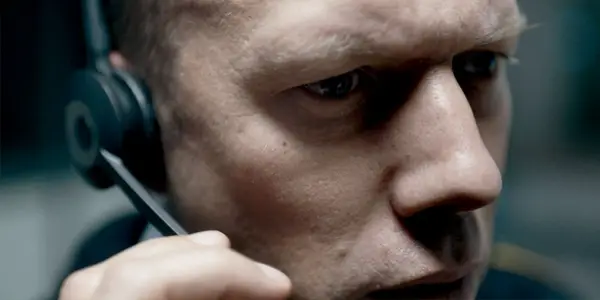The Guilty is a remarkably proficient and assured debut from Gustav Möller, and after its successful festival run, it’s no surprise that Denmark has picked it as their Oscar submission this year. Much like the similarly claustrophobic car-bound thriller Locke from 2013, the premise for The Guilty may initially sound like a gimmick, or due to its Danish origins, a Dogme ’95 exercise in making a movie with the most minimalistic conditions.
This low-budget first feature has been stripped down to its most basic elements; one man, one room, no music, with all of the action happening off-screen (filtered through the protagonist’s headset) in a relatively clear-cut story of a rational man being pushed into an area where rationality won’t serve him anymore – take the camera away and this is just great theatre. This economically efficient quality has transformed Möller and Emil Nygaard Albertsen’s sharp screenplay into a thriller in its most purest form, a dynamic blend of visceral drama and psychological stress that will definitely be remade by Hollywood within the next 3 years.
Lives on the Line
The rational man in question is suspended police officer Asger Holm (Jakob Cedergren). We first see him midway through his shift as an emergency police dispatcher, whose workplace attitude for the plodding night-time gig idly sits between rigid conformism and sarcastic rebellion. He treats his callers with contempt; a lost junkie is openly disregarded, and he delays help for a mugging victim after learning that he was robbed whilst trying to find a hooker.

Asger telling the man “It’s your own fault, isn’t it?” might seem like a glib statement at the beginning, but becomes the thematic motif for the film, which really kicks off when the bored operator receives a bizarre call from Iben (Jessica Dinnage, delivering an effective vocal performance), who addresses Asger as “baby”, and due to his previous calls, is about to hung up on until he quickly realises she’s actually been kidnapped, faking a call to her daughter to make contact with the police.
As the sordid details of Iben’s kidnapping are uncovered, so is the state of the man trying to solve it, a politically poignant backstory that has formed a mentally frail man, whose quiet composure is being barely kept together as his long night continues.
On the eve of a court date that’ll determine the return of his old job, Asger juggles the phone-lines between Iben, her young daughter back at home, the Zealand cops who are out in the rain looking for the missing mother and his old squad partner, who is forced to cross some moral boundaries in the name of justice (and as we learn, is unfortunately ironic request in relation to Asger’s pending court appointment).
Each call builds upon a web of ambiguous information, whether it be the details about Iben’s situation or the reasons behind Asger’s dismissal, thankfully avoiding any ‘hero cop’ cliches – nobody is forced to turn in their badge and gun in the pursuit of law-breaking righteousness.
The twist-filled script is uncompromisingly realistic in style and passionately explicit in theme, hell, even the title alone is pretty clever in hindsight. Some may find it easy to pick apart its more contrived moments, as it relies on the unpredictable, strange and complicated nature of everyday people, inherent traits that defy basic simplification. The way certain characters withhold important pieces of information until it’s narratively convenient only makes sense within the context of a cinematic framework, but the film is engrossing enough to look past the artificial nature of how the action unfolds.
More Than A Radio Play
Every character is given a sense of ambivalence that transcends knee-jerk morality, nobody is black or white but more of an equivocal grey, which is also appropriate when talking about the drab office setting of the Denmark police station. The film’s unobtrusive, utterly confident attention to detail, including the appropriately quotidien production design, helps paint the picture of a world existing outside of the restrictive confines of Asger’s workplace.
This expansiveness is also assisted by Oskar Skriver’s impressive sound design, who fills every phone call with a detailed soundscape that sells every interaction – just the sound of a policeman’s footsteps induces more anxiety than most full-blown visual set-pieces I’ve seen in any horror film this year.
It can be quite the burden on any actor to carry a film by themselves, but Jakob Cedergren effortlessly controls the screen at all times, oscillating between intense determinism and nervous deliberation when required. His charisma is most evident through his worn-out but aware eyes, his contemplative state suggesting a withholding stillness that Jasper J. Spanning’s camerawork knows exactly how to deal with.
Möller’s own eye for detail rarely fails him, as he sometimes fleetingly resembles a contemporary Sidney Lumet, certainly sharing his skillful use of the camera to build tension. This cooly contemplative camera style imparts a constant, stirring tension which finds release only in the disruptive buzz of each new incoming phone call.
The Guilty: Conclusion
There’s a reason why The Guilty has been scoring so many audience awards during its prolific festival run, as Gustav Möller’s compact but crushing single-room drama successfully secures our emotional and visceral involvement whilst quite boldly moving into some genuinely dark areas.
What are some of your favourite single-room dramas? Let us know!
The Guilty will be released in theaters in the US on October 19, 2018 and the UK on October 26, 2018. For all international release dates, see here.
Does content like this matter to you?
Become a Member and support film journalism. Unlock access to all of Film Inquiry`s great articles. Join a community of like-minded readers who are passionate about cinema - get access to our private members Network, give back to independent filmmakers, and more.